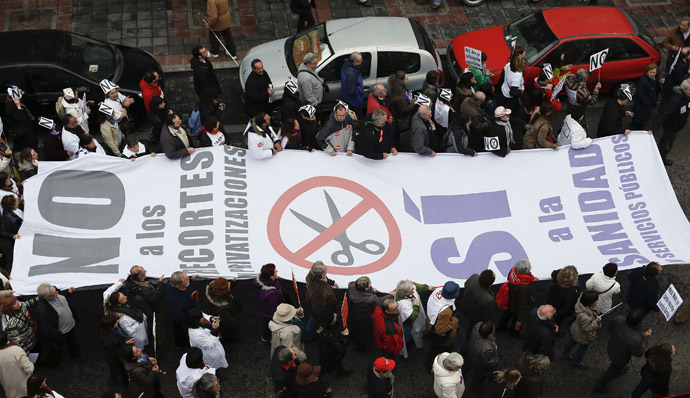‘US, European leaders in denial about human cost of austerity’
Austerity in healthcare is a false economy as the immediate savings are outweighed by the huge spending required to cover the damage to people’s heath in the future, Dr. David Stuckler of Oxford University told RT.
Scientists at Oxford and Stanford Universities have brought to
light the negative effect austerity measures have on health. They
say spending cuts and mass lay-offs across Europe and North America
are fueling a spike in suicide and depression. The academics behind
the study believe the global financial crisis has caused as
many as 10,000 to take their own lives.
Stuckler, who is leading the research into the impact of austerity
economics on public health, says that health and education are the
best channels to speed up the economic recovery, therefore cuts in
the those sectors should be avoided.
RT: The situation was already extremely difficult for
millions of people because of the economy. Why have you singled out
austerity as a factor?
David Stuckler: What we’ve seen in studying recessions over
the past century and with the focus on the present crisis is that
recessions hurt. But when politicians with deep cuts to vital
social supports, they can turn those recessions lethal. In the
worst case we’ve seen Greece - after it cut its malaria prevention
budget we saw the return of outbreaks that the country has kept
under control over the past four decades. We’ve seen HIV infection
spike by 200 per cent at a time when the HIV budget was cut.
Similarly, we’ve seen across Europe austerity breed a series of
epidemics – from suicide to foregone access to healthcare to
tuberculosis outbreak and even dengue fever.

RT: According to your theory countries that did not pursue austerity cuts, like Iceland, should be doing much better in health terms than those that did, is that the case?
DS: That’s a very good point because Iceland suffered the worst banking crisis in history – all of its biggest banks failed and its debt jumped to over 800 per cent of GDP. But its people voted against austerity and instead shored up support in its health system. No one lost access to healthcare and, in fact, this country, which was once the happiest society in the world, again in 2011 was ranked as the happiest society in the world.
RT: 10,000 is a lot of people. What do you think is the likely reaction from governments around the world to that and how do you think they should react?
DS: So far Europe’s leaders have been in denial about the human cost of the austerity policies that have been pursued across Europe and pursued in North America, with the sequester recently passed. What we need to do is take into account the health effects of economic policies. Had austerity been run like any other drug trial it would’ve been discontinued because of its deadly side effects.
RT: Many leaders claim by making these cuts it is the only way to end the crisis. Are you of the same opinion?
DS: First, the tuberculosis outbreaks, for example, that New York suffered in the mid-1990s ended up costing millions to control. So austerity in health is a false economy. But also we’ve looked at something called the fiscal multiplier this is the effect of government spending on the economy. It’s been subject of much debate lately. And what we’ve found is that investments in health and education as well are two of the best channels with large and positive fiscal multipliers that boost employment and spending power and help spur recovery. If you are going to make cuts there are other areas that have less damaging effects on the economy. So there’s a case in economic argument for protecting health, not only for its long-term social and health benefits, but also as strategy to spur recovery.
The statements, views and opinions expressed in this column are solely those of the author and do not necessarily represent those of RT.












